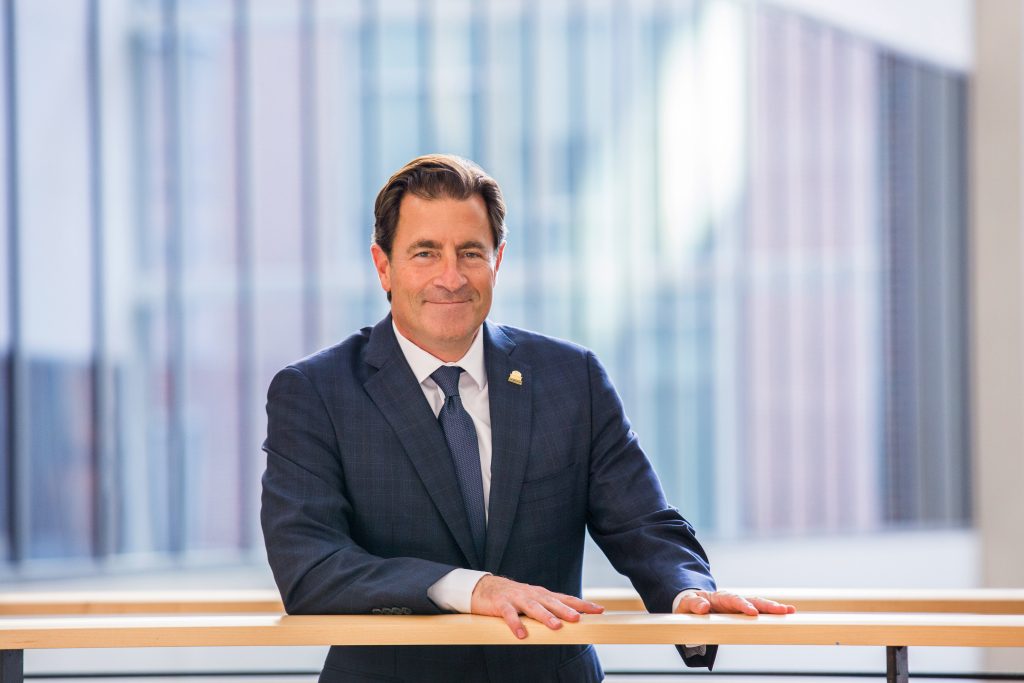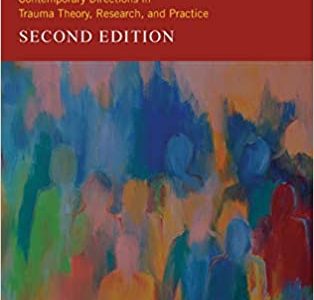
University of Maryland School of Medicine (UMSOM) Dean Mark Gladwin, MD, says one of his greatest passions is working in an academic environment.
“There is an opportunity here to meet with such a diverse range of leaders, influencers, faculty, students, staff, and alumni. I couldn’t be more excited to start every day,” Gladwin said when he started his tenure in August 2022.
A leading heart, vascular, and lung physician-scientist, Gladwin maintains an active research group and is currently the principal investigator on three National Institutes of Health-funded research grants and a clinical trial grant. He also serves as the John Z. and Akiko K. Bowers Distinguished Professor, UMSOM, and vice president for medical affairs, University of Maryland, Baltimore (UMB).
Gladwin has overseen UMSOM as it has undertaken numerous groundbreaking partnerships and innovations, including the establishment of the University of Maryland Institute for Health Computing, led by UMB and the University of Maryland, College Park, in partnership with the University of Maryland Medical System and Montgomery County, Md.
“Our vision is for this to become the East Coast Silicon Valley for health computing,” Gladwin said when the institute was announced in 2022 by the University of Maryland Strategic Partnership: MPowering the State.
In late 2022, Gladwin announced plans to launch a neuroscience institute called the University of Maryland-Medicine Institute for Neuroscience Discovery (UM-MIND) that will accelerate translational research of the brain by facilitating interaction between basic and clinical scientists and enhancing collaborative research across UMSOM and UMB. In addition, UMSOM received one of the largest gifts in its history in early 2023 to establish the Kahlert Institute for Addiction Medicine.
Also this year, UMSOM faculty members performed their second historic xenotransplant (and the second in the world) of a genetically modified pig heart into a living patient with end-stage cardiovascular disease at the University of Maryland Medical Center.
CATALYST magazine sat down with Gladwin as he began his second academic year at UMSOM to talk about his goals for the school, his research, and the future of medicine.
What has been your most rewarding experience during your tenure as UMSOM dean so far?
My most rewarding experience so far has included the privilege of learning about all the amazing departments, centers, institutes, programs, accomplishments, and various aspects of our talented school. I did a listening tour last fall, where I began to learn about what I call UMSOM’s “shock and awe” list. That list includes: our historic xenotransplants, the mix-and-match study for COVID-19 vaccines, our COVID-19 testing laboratory, our malaria research, our radiation oncology research, extracorporeal membrane oxygenation in patient care, focused ultrasound, orthopaedic trauma, our Amish research study, and our kidney transplantation program. Not to mention, almost every time I open my hard copy of The New England Journal of Medicine, I find another one of our faculty members with a published article. We had 12 articles from UMSOM faculty in the span of a year. It is extremely rewarding to lead a school with such immense talent.
What are your goals for UMSOM in the next year? The next five years?
My goals for UMSOM in the next five years include addressing generational challenges by aligning our efforts across the tripartite mission; breaking down silos with innovative translational centers of excellence; advancing and nurturing fundamental and clinical science; embracing the potential of big data and information technology for precision-oriented patient access and population health services; harnessing the power of data analytics to target resources and improve performance across clinical, research, education, and philanthropic missions; enhancing pipelines to train and recruit in areas of unmet need; empowering and supporting our providers and faculty by increasing operational efficiencies; and leading the fight for social justice, health equity, diversity, and integrity in science.
What do you see as the future of medicine and how will data play into that?
Recent advances in artificial intelligence (AI) and computing will allow us to create premier learning health care systems across the country that can evaluate both de-identified and secure digitized medical health data to diagnose, prevent, and treat diseases in patients. This is the future of medicine. Harnessing the innovations in health care technologies has become an urgent priority as our nation faces an economic crisis and contends with the effects of the COVID-19 pandemic. Health care leaders have long recognized that health care efficiencies can be greatly improved with the digitization of medical records.
What is your own research currently focused on?
I specialize in the study of reactive nitrogen molecules, like nitric oxide and nitrite, and how they regulate blood flow via reactions with hemoglobin. My federally funded research laboratory is conducting studies and clinical trials in the field of nitric oxide, nitrite, and vascular biology. Most recently, my research team and I engineered a protein that reverses carbon monoxide poisoning in mice, a significant discovery that could potentially lead to the creation of the first antidote in humans to the often deadly poisoning, which accounts for more than 50,000 emergency room visits in the United States annually and is one of the leading global causes of poisoning death.
I’m also leading a 22-site Phase II clinical trial in France, Brazil, and the United States that is exploring whether an innovative type of blood transfusion that uses the patient’s own blood can improve the outcomes and extend survival in patients with sickle cell disease, which overwhelmingly impacts the Black community and reduces their average lifespan by 22 years.
What would people be most surprised to learn about you?
I think people would be surprised to learn about how personal my appreciation for different perspectives and cultures is. I grew up as a child of social scientists, which meant that I needed to live and adapt in varying cultures. I learned a lot about what true resiliency looks like — witnessing firsthand the hardship faced by my friends and other children in these countries helped with my work ethic and appreciation for hard work and a generous spirit.



